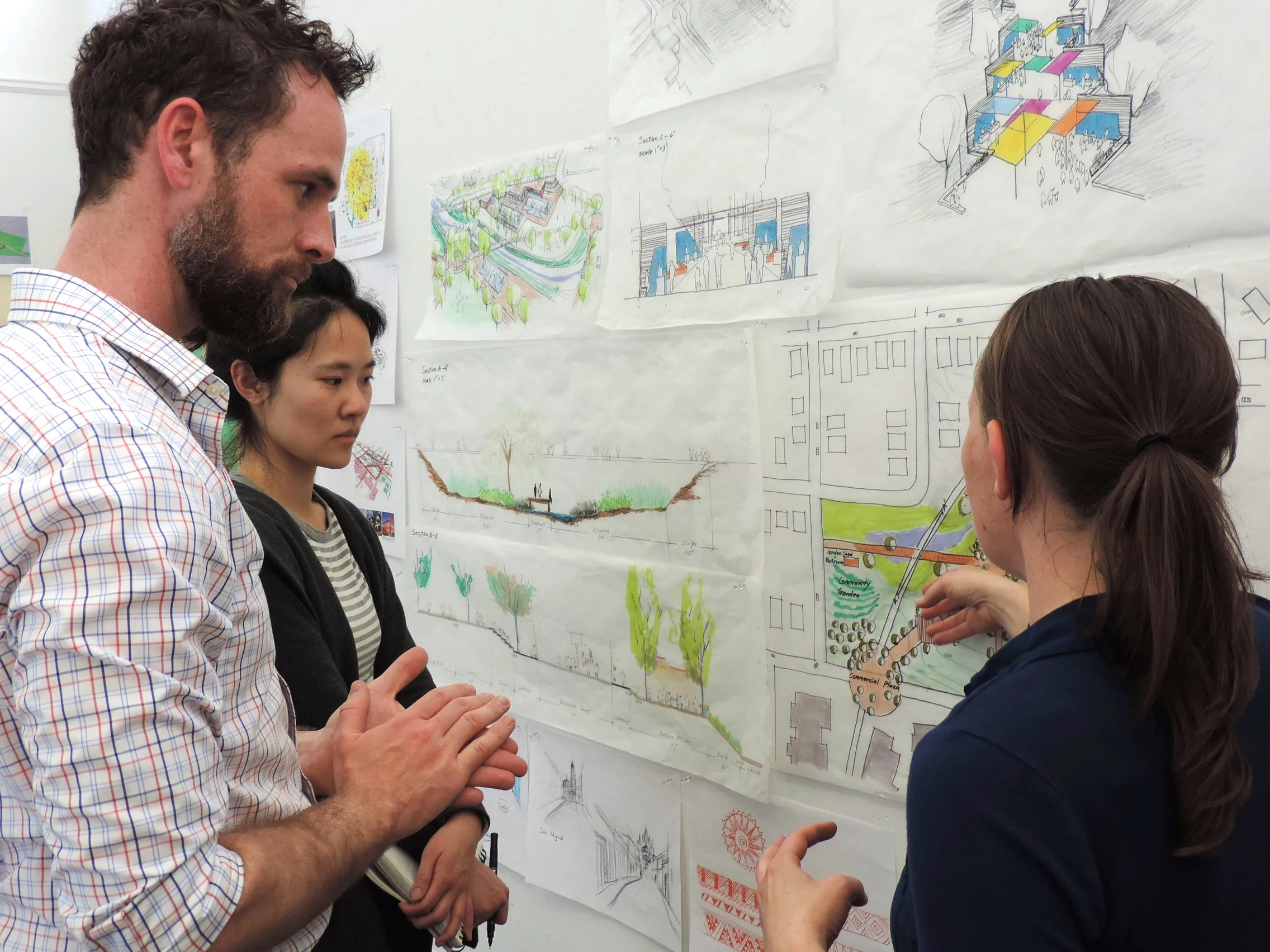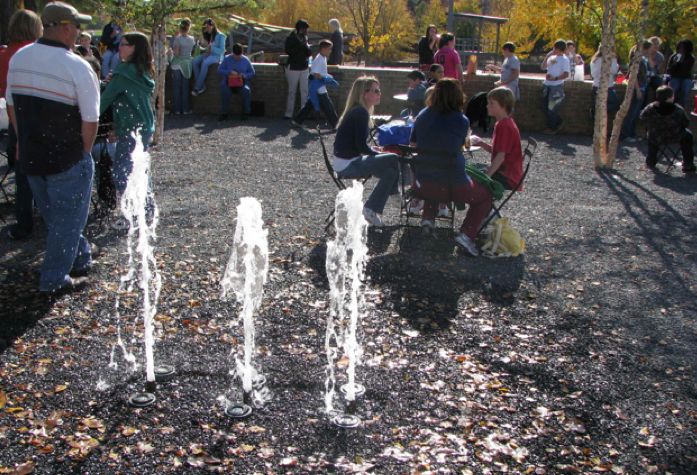North Carolina is proud to house unique and award-winning landscape architecture programs across the state. Click the links below to learn more about each program.
North Carolina A&T
>>Natural Resources and Environmental Design Landscape Architecture Program
North Carolina State University
>>Department of Landscape Architecture
Wake Technical Community College
>>Landscape Architecture Technology Curriculum
NC A&T State University
Natural Resources and Environmental Design's Landscape Architecture Program
Landscape Architecture is concerned with the quality of land use. It includes the analysis of environmental and social factors and recommendations for the preservation, planning, design, construction, management and research of natural and developed land areas. In NC A&T's Department of Natural Resources and Environmental Design, the scope of projects varies from broad, regional landscape planning and analysis to detailed site design.
For information about the NC A&T's Natural Resources and Environmental Design's Landscape Architecture Program, please go to this link:
Landscape Architecture at the Department of Natural Resources and Environmental Design at North Carolina A&T State University
NC State University Programs
The broad discipline and practice of Landscape Architecture continues to expand as landscape architects engage challenges of human settlement on the land. Landscape Architecture at NC State University lives within the College of Design, where design thinking is taught within an innovative interdisciplinary scholarship environment focused on making the world a better place. As North Carolina’s academic and scholarly home for the profession of landscape architecture we welcome and value individuals from diverse backgrounds, experiences, and perspectives committed to undertaking the design challenges and opportunities associated with land and landscape.
Reflecting the growing urban population and fueling the program’s professional academic, scholarly, research and extension agenda are the existing and emerging “normal to wicked” landscape design issues, challenges, and opportunities facing small to large communities and cities of the southeast United States and beyond.
The Department’s interdisciplinary approach focuses on design issues of urban growth and (re)development, integration of resource-conserving urban infrastructure systems, place-making embodying cultural and economic vitality, adaptation to climate change, and promotion of environmental justice. Our mission is to provide students with the intellectual capacity coupled with technical and form giving “design know-how” expected to create innovative, long-term solutions focused on human and ecosystem health, social equity, and quality of life.
Academic programs, delivered year round, include core and advanced design studios and seminars that expose our students and faculty to multiple learning experiences in the Research Triangle Region, the many historic and contemporary urban destinations of the South East, the NC State University European base in Prague, and an interdisciplinary program in Ghana. Diverse seminars in sustainable design, site planning, environment and behavior, landscape history and theory, media production, landscape planning, research methods, and professional practices link designers with their constituents through participatory processes using the latest technology. We emphasize evidence-based inquiry and design thinking that prepares students for current practice as well as leadership of the dynamic, transformative profession of the future.
The department’s academic programs include:
An accredited graduate level first professional Master of Landscape Architecture (MLA) degree program – This is an 84 credit hour program accredited by the Landscape Architecture Accreditation Board. Advanced standing in the program may be given on a case-by-case basis depending upon prior academic course work in landscape architecture and other design disciplines. (The undergraduate Bachelor of Landscape Architecture (BLA) program is in the 3rd year of a planned 5-year phase out; applications to this program are not being accepted).
A post-professional Master of Landscape Architecture (MLA) degree program – This is a 48 credit hour program for students who already hold an accredited Bachelor in Landscape Architecture (BLA) degree.
An interdisciplinary graduate Certificate in City Design – This is a 15 credit hour program delivered jointly with the School of Architecture, that focuses on the existing and emerging planning and design issues, challenges, and opportunities facing small to large communities and cities.
An interdisciplinary graduate Certificate in Design of Intergenerational Landscapes – focused on design and management of outdoor spaces for children and families (anticipated to be launched in 2014).
Collective student and faculty core values reflect passions about the health and wellbeing of human and non-human communities and systems. With a commitment to understanding the consequences of human action on the land and to responding with community based, politically savvy solutions, we are dedicated to teaching, research, and engagement activities that inspire and prepare landscape architects to lead design processes that recognize and respect human interdependence with multiple concurrent social, ecological, and economical systems.
Students benefit from close relationships with faculty and fellow students across the design disciplines within the College of Design and draw on the vast opportunities offered by a top-ranked research-extensive land grant university. Learning interactions build upon and develop each student’s unique interests and capabilities. The diverse departmental faculty works across the NC State University campus to broaden academic resources and areas of interest, identify interdisciplinary expertise, and expand viewpoints. All share a sincere appreciation for each student and for one another predicated upon understanding that students learn design in different ways and possess non-uniform skill sets.
Faculty interests intersect and focus student attention on the design of evolving communities and cities, including:
Interdisciplinary focus on urban infrastructure systems and the development and transformation of existing and emerging territories;
Community engagement, participatory design, and service learning;
Sustainable site planning and design, design and construction technologies, design/build implementation, post-occupancy evaluation, and landscape asset management;
Design of intergenerational landscapes, including children’s play and learning; research addressing impacts of outdoor environments on health outcomes, active lifestyles, learning processes, attention functioning, psychological restoration, and other markers of the wellbeing of living systems;
Traditional and new digital communication and representation media that enhance constituent participation in analysis, design, presentation, and evaluation; and
Design education, effective teaching, and communication to serve the needs and expectations of communities, changing societal needs, and professional practices.
We expect graduates to apply their talents to lead and advance the knowledge and capabilities of the profession and to be competent, entrepreneurial, and competitive in the job market and within their communities.
For more information, please contact:
Meg Calkins, FASLA
Professor and Department Head
mecalkin@ncsu.edu, 919 515 8342
Wake Tech Landscape Architecture
The Landscape Architecture Technology curriculum at Wake Technical Community College in Raleigh, NC, prepares individuals as landscape architecture technicians in landscape design, construction, and architecture fields. The well-trained landscape technician will find excellent prospects for employment and advancement, including large-scale site design and supervision and residential landscape design.
Department Head
Sloan Burton
(919) 866-5326




